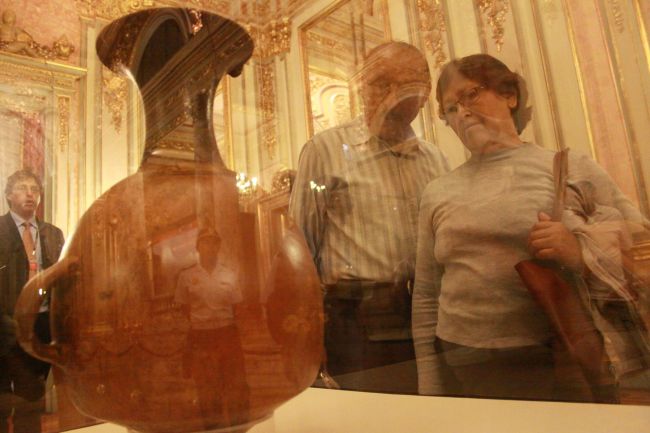Machu Picchu 100th Anniversary Likely To Lack Yale’s Artifacts
posted on August 13th, 2010 in Archaeology, Machu Picchu, Peru, Peru-Yale Controversy
Machu Picchu Centennial Likely To Lack Yale Artifacts
Yale Daily News
May 13, 2010
With the 100th anniversary of Hiram Bingham’s discovery of the Inca archeological treasure Machu Picchu approaching, Peru’s Chamber of Tourism is preparing to celebrate — but without many of the site’s most precious artifacts, which remain in Yale’s collection…
Though Peruvian officials originally hoped the artifacts would be returned in time for the July 2011 commemoration, the prolonged legal battle with Yale, which has been dragging on since 2008, will likely make that impossible. Instead, the Chamber of Tourism plans to use the event to raise awareness about the absent artifacts and to pressure Yale to return them.
“With this effort, we seek to build the archeological museum of Cusco,” Carlos Canales, president of the Chamber of Tourism, told the Peruvian news agency Andina. “We will focus in social networks to recover these objects and make Yale graduates aware of our request and support it,” he said.
Bingham, who graduated from Yale in 1898, brought a variety of household and art items and human remains back to New Haven from Peru in the early 1900s after the Peruvian government agreed to loan them to the Peabody Museum. Peru sued for the return of the artifacts in 2008; Yale moved that the charges be dropped because the statute of limitations had passed. In March, Peru dropped six of the 17 charges against Yale, many of which accused the University of fraud.
Vice President and General Counsel Dorothy Robinson said in March that the dropped charges were “unfounded” but added that she thought the remaining 11 charges were equally misguided.
Canales said Peru’s Ministry of Foreign Trade and Tourism and its Export and Tourism Promotion Board will also be involved in the plans for the upcoming centennial.
Yale Moves to Dismiss Peru Suit
Yale Daily News
January 12, 2010
In court papers filed in federal court last Friday, Yale argued that a lawsuit by the government of Peru over ownership of ancient Inca artifacts should be dismissed in Connecticut court.
According to the papers, too much time has passed since Yale acquired the artifacts. Yale argues that Peru’s claim to the artifacts is no longer valid because of a Connecticut law that establishes a three-year statute of limitations which Yale argues applies to Peru’s claims. Peru has responded that, under Peruvian law, claims like this one are not subject to such restrictions. If the federal court sides with Yale and dismisses Peru’s case, it would end a year-long legal dispute and an international property rights battle spanning almost a century.
In December of 2008, Peru first sued Yale for possession of artifacts taken from Peru by the scholar Hiram Bingham III between 1911 and 1915. The lawsuit sought the return of the ancient relics and more than $75,000 in damages for breach of contract, unjust enrichment and fraud. In 1921, Yale argues in Friday’s papers, the University returned dozens of boxes of those artifacts. Peru knew the University would keep the remainder, Yale’s lawyers claim. According to Friday’s filing, Yale then displayed the remaining pieces at the Peabody Museum and published books describing the pieces.
None of these actions met with any complaint from Peru at the time, Yale claims in the documents. In fact, Peru later invited Bingham back to the country and even named a highway after him. It was only in 2005 that Peru seriously tried to reclaim the items.
The lawsuit was nearly avoided when the dispute came close to a settlement in 2007. Yale agreed to give legal rights to some of the artifacts, which would have traveled in a joint exhibit funded by Yale and then returned to a museum in Cuzco, the ancient Inca capital. But Peru pulled out of the deal because of a disagreement over how many artifacts would be returned.
When Peru’s suit came at the end of the next year, Yale filed to move the case from Washington, D.C., to Connecticut, arguing that Washington had no jurisdiction over the matter. Peru responded to that motion, and Friday’s documents are a response to that response.
“In the 21st century, long after everyone with any personal memory of the expeditions had died, Peru claimed that Yale had not returned enough of the artifacts and demanded that it now return any artifacts that Bingham had exported from Peru,” Yale attorneys wrote in Friday’s documents.
But Peru maintains that it never gave up its ownership rights to the artifacts. In its lawsuit, Peru alleged that Yale has continued to hold the most culturally important relics found at the Macchu Picchu ruins illegally.
As for the statute of limitations, Peru argued that Yale never had legitimate ownership, so the time frame is not relevant.
“Yale’s mere retention of the artifacts establishes nothing,” Peru’s lawyer wrote in November, responding to Yale’s dismissal.
Peru claims it has government documents from Bingham’s original expedition under which he was allowed to excavate the artifacts, but Peru retained ownership and the right to demand their return at any point. These documents, Peru says, prove Yale is violating United Nations cultural property agreements by not returning the relics now that Peru has demanded them back.
Yale’s filing requested that the court hear an oral argument for the case.

